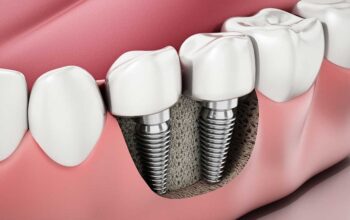It’s important to maintain dental health at every stage of life. Every age group has different oral health issues to deal with, and knowing how to handle them will help guarantee a lifetime of good dental health. This article will offer helpful dental health advice for kids, teens, adults, and seniors who are considering a dentist in Houston. Now, let’s get started!
Baby (birth to one month)
An infant cannot speak. Generally, infants start to erupt milk teeth between five months and one year. Just like permanent teeth, these baby teeth also require protection. These are the top three guidelines for baby dental care.
Gently Cleaning: Use a soft, moist towel or gauze to clean your baby’s gums after feeding gently.
Minimize Nighttime Bottle Feeding: To prevent tooth decay, don’t let your infant sleep with a bottle in its mouth.
First Dental Visit: To track oral development, schedule your baby’s initial dental visit around their first birthday.
Age Group: 0–2 Years
Between six and eight months, a baby’s teeth begin to erupt. However, these are incredibly fragile teeth and gums, so selecting dental care products requires additional consideration. At this point, the best option is to use infant-sized toothbrushes with soft bristles. It is also a good idea to visit a dentist to assess the infant’s oral health. In addition, an expert’s advice and assistance can be used to prescribe further dental care items.
Kids (2–12 Years Old)
Your child’s dental hygiene becomes important as they become older. The overall health of children depends on their oral health. For the oral health of the kids, three devices are very important:
Frequent Brushing and Flossing: Brushing teeth twice daily is vital to avoid cavities and plaque accumulation. Along with brushing twice, flossing once a day is also important.
Balanced Diet: A well-rounded diet should consist of fruits, vegetables, and calcium-rich foods while limiting sugary snacks and beverages.
Dental Checkups: It is crucial to have regular dental checkups to detect problems and cure them in time.
Teens (Ages 13 to 17)
Most teenagers live hectic lives, but dental health should be the priority. Follow the given steps to avoid the oral health problems in teenagers:
Consistent Oral Care: To maintain gum health and avoid cavities, follow the routine of brushing, flossing, and dental checkups.
Orthodontic Care: Pay attention to the advice your orthodontist gives if you are getting orthodontic treatment.
Avert Sugar-Sugary Snacks and Tobacco: To protect oral health, quit smoking and excess of sugar consumption.
Adults (Age 18 or Over)
Ensuring good oral health is a lifetime commitment. Adults face many problems. However, the following three suggestions may be useful:
Frequent Dental Visits: Visit dental clinics regularly to diagnose the treatment early.
Effective Brushing and Flossing: To prevent gum disease, brush twice a day for at least two minutes each time and floss every day.
Choosing a Healthier Lifestyle: Reducing alcohol intake, managing stress, and quitting smoking can all improve dental health.
Adults 65 years of age and older
Oral hygiene is crucial for elderly individuals, who often have to cope with more complex problems. The following advice can help you keep your teeth healthy as you become older:
Handle Dry Mouth: To relieve dry mouth, drink plenty of water, chew sugar-free gum, and use moisturizing mouthwash.
Maintaining Proper Denture Care: If you wear dentures, you should bathe and clean them daily to prevent discomfort and infections.
Frequent Oral Cancer Screening: To identify any possible problems early, schedule routine oral cancer screenings with your dentist.
Conclusion
All age groups—from young children to the elderly—need a specific kind of care. You may secure oral health by setting priorities, adhering to these guidelines, and maintaining basic dental hygiene.




